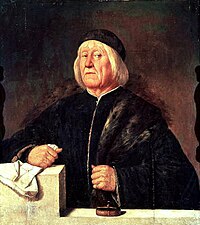music.wikisort.org - Poet
Teofilo Folengo (Italian pronunciation: [teˌɔːfilo foˈleŋɡo]) (8 November 1491 – 9 December 1544), who wrote under the pseudonym of Merlino Coccajo[lower-alpha 1] or Merlinus Cocaius in Latin, was one of the principal Italian macaronic poets.

Biography
Folengo was born of noble parentage at Cipada near Mantua, Italy.[1]
From his infancy he showed great vivacity of mind, and a remarkable cleverness in making verses. At the age of sixteen he entered the monastery of Sant'Eufemia near Brescia, and eighteen months afterwards he became a professed member of the Benedictine order.
For a few years his life as a monk seems to have been tolerably regular, and he is said to have produced a considerable quantity of Latin verse, written, not unsuccessfully, in the Virgilian style.
About the year 1516 he forsook the monastic life for the society of a well-born young woman named Girolama Dieda, with whom he wandered about the country for several years, often suffering great poverty, having no other means of support than his talent for writing.[1]
Some of his later years were spent in Sicily under the patronage of Ferrante Gonzaga, who served the emperor Charles V as Viceroy of Sicily (1535–1546).
He appears to have been based at the abbey of San Martino delle Scale (Monreale). In 1543 he retired to the Santa Croce monastery of Campese, near Bassano; and there he died on December 9, 1544.[1]
Famous Works

His first work, under the Latin pseudonym Merlinus Cocaius, was the macaronic narrative poem Baldo (1517), which relates the adventures of a fictitious hero named Baldo ("Baldus"), a descendant of French royalty and something of a juvenile delinquent who encounters imprisonment; battles with local authorities, pirates, shepherds, witches, and demons; and a journey to the underworld.
Throughout his adventures Baldo is accompanied by various companions, among them a giant, a centaur, a magician, and his best friend Cingar, a trickster. Baldo blended Latin with various Italian dialects in hexameter verse.[citation needed]
Though frequently censured, it soon attained a wide popularity, and within a very few years passed through several editions and was later expanded by Folengo.[1][lower-alpha 2]
Folengo's next work was Orlandino, an Italian poem of eight cantos, written in rhymed octaves. It appeared in 1526, and bore on the title-page the new pseudonym of Limerno Pitocco (Merlin the Beggar) da Mantova.
In the same year, wearied with a life of dissipation, Folengo returned to his ecclesiastical roots; and shortly afterwards wrote his Caos del tri per uno, in which, partly in prose, partly in verse, sometimes in Latin, sometimes in Italian, and sometimes in macaronic, he gives a veiled account of the vicissitudes of the life he had lived under his various names.[1]
We next find him about the year 1533 writing in rhymed octaves a life of Christ entitled L'Umanità del Figliuolo di Dio; and he is known to have composed, still later, another religious poem upon the creation, fall and restoration of man, besides a few tragedies.
These, however, have never been published.[1]
Notes
- Or Cocajo or Cocaj
- The work was a model for Rabelais. An English translation was published for the first time in 2007 by Ann E. Mullaney as part of The I Tatti Renaissance Library.
References
- One or more of the preceding sentences incorporates text from a publication now in the public domain: Chisholm, Hugh, ed. (1911). "Folengo, Teofilo". Encyclopædia Britannica. Vol. 10 (11th ed.). Cambridge University Press. pp. 598–599.
English translations
- Teofilo Folengo (Author), Ann E. Mullaney (Translator). Baldo, Volume I, Books I-XII (The I Tatti Renaissance Library). Harvard University Press. ISBN 978-0-674-02521-9
- Teofilo Folengo (Author), Ann E. Mullaney (Translator). Baldo, Volume II, Books XIII-XXV (The I Tatti Renaissance Library). Harvard University Press. ISBN 978-0-674-03124-1
External links
- Works by Teofilo Folengo at Project Gutenberg
- Works by or about Teofilo Folengo at Internet Archive
Literature
- Massimo Colella, «Sol d’Orlandin i’ canto, e nondimeno…». Lettura dell’'Orlandino' di Teofilo Folengo, in «Rivista di Letteratura Italiana», XXXVII, 3, 2019, pp. 9-29.
На других языках
- [en] Teofilo Folengo
[es] Teófilo Folengo
Teófilo Folengo, nacido como Gerolamo Folengo, más conocido por sus seudónimos de Limerno Pitocco, Merlín Cocayo o Merlinus Cocaius (Mantua, 8 de noviembre de 1491 – Bassano del Grappa, Vicenza, 9 de diciembre de 1544), fue un escritor, humanista y humorista benedictino italiano.[fr] Teofilo Folengo
Gerolamo, dit Teofilo Folengo (ou Folengi), né à Mantoue le 8 novembre 1491 et mort à Bassano le 9 décembre 1544, est un poète burlesque et un écrivain italien plus connu sous le nom de Merlin Coccai, Merlino Coccajo, nom qui veut dire tout simplement Merlinus Coquus, Merlin le cuisinier[1].[ru] Фоленго, Теофило
Теофи́ло Фоле́нго (8 ноября 1491 — 9 декабря 1544) — итальянский поэт, наиболее видный представитель так называемой макаронической поэзии.Другой контент может иметь иную лицензию. Перед использованием материалов сайта WikiSort.org внимательно изучите правила лицензирования конкретных элементов наполнения сайта.
WikiSort.org - проект по пересортировке и дополнению контента Википедии